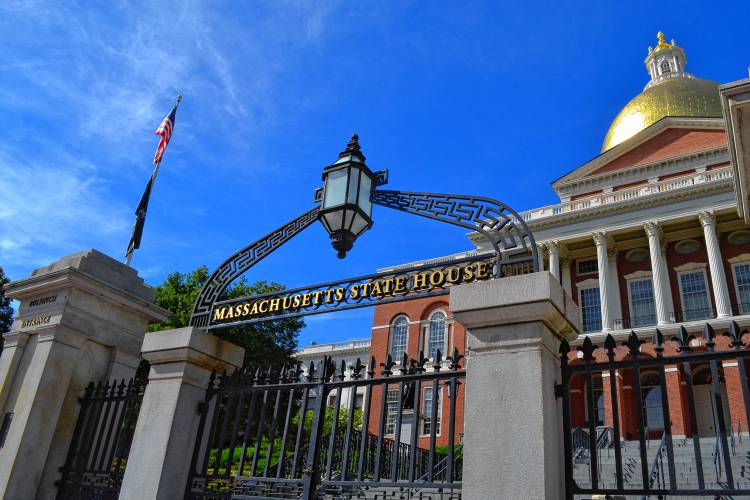Wages, turnover put drag on early education

The Massachusetts State House in Boston
|
Published: 03-01-2024 5:01 PM
Modified: 03-07-2024 4:55 PM |
BOSTON — The early education and care sector is seeing high turnover and a lack of younger educators entering the field, according to a report released Tuesday by The Boston Foundation, while the study’s authors recommended lifting up the sector with “living wages” and mapping out “career trajectory options.”
Turahn Dorsey of the Eastern Bank Foundation, who moderated a discussion at the report’s release event, said the EEC realm is experiencing a “generational shift” more “acutely” or “painfully” than other economic sectors.
“Part of the solution is easy,” Dorsey said. “Fundamentally, we have to value the work for what it is worth. Full stop.”
Early education and care has attracted renewed interest, and funding, on Beacon Hill in recent years, particularly after the pandemic highlighted how important having affordable and accessible child care options is to keeping parents, and particularly women, in the workforce.
Top Democrats in both chambers have expressed a desire to address early education issues this session, but no leadership-backed legislation has surfaced with about five months left for significant work this legislative session, and the state’s stalled revenue picture may be serving as a drag on how much more can be invested in the sector.
Authored by Boston Opportunity Agenda, the Boston Birth to Eight Collaborative, and the City of Boston’s Office of Early Education, the report drew on 653 responses to a statewide survey of the sector, with more than half of those responses coming from Boston. It also called for greater advocacy for federal investments and tracking sector and workforce data.
Looking specifically at Boston child care centers, the survey found 52 percent of the facilities had experienced a turnover rate that falls under the U.S. Department of Health and Human Services definition of “high turnover” – when a center loses at least 20 percent of its early educators in a single year.
And in Boston’s EEC workforce, only 1 percent of family child care educators who answered the survey were in the 18-29 age bracket, said co-author Paula Gaviria Villarreal, the city’s child care analytics and program director. Sixty-four percent of the workforce is 45 years old or above.
Article continues after...
Yesterday's Most Read Articles
 Sportsman’s Corner: The quest for the Super Slam
Sportsman’s Corner: The quest for the Super Slam
 Cryptozoology exhibits featured at Education Earth Museum
Cryptozoology exhibits featured at Education Earth Museum
 Athol Police Logs: April 12 to April 19, 2024
Athol Police Logs: April 12 to April 19, 2024
 Athol Royalston Middle School Honor Roll Term 3
Athol Royalston Middle School Honor Roll Term 3
 Work on Pinedale Avenue Bridge connecting Athol and Orange to resume
Work on Pinedale Avenue Bridge connecting Athol and Orange to resume
 Longtime public servant Richard Sheridan dies at 78
Longtime public servant Richard Sheridan dies at 78
“This is important because we need to think of targeted strategies to bring in a young workforce,” Villarreal said.
Family child care (FCC) educators’ salaries in Boston are “extremely variable,” the survey found, averaging $14.30 per hour. Center-based teachers in Boston earned an average of $21.50 per hour, and center-based directors or administrators were paid an average $23.30 per hour.
“We see that on average, and this is an average, FCC educators make less than an entry-level retail store cashier, and I know this for a fact because I looked for the job online. And center-based teachers make less than the living wage for one adult and no children,” Villarreal said.
The authors cited the MIT Living Wage Calculator, which was also cited Tuesday by Raise Up Massachusetts, a coalition that advocates for raising the minimum wage.
Raise Up said that a single adult Bay Stater with no children, working full time, saw his or her “living wage” spike from $21.35 per hour in 2023 to $27.89 per hour in 2024.
“Massachusetts’ affordability crisis is hitting low-wage workers the hardest, and it’s a big threat to our state’s economy,” Shanique Rodriguez of the Massachusetts Voter Table said Tuesday of what the coalition called “alarming new research.”
Tuesday morning’s panel discussion featured Danielle Grant, an educator and graduate of UMass Boston’s Institute for Early Educator Leadership and Innovation, who spoke of how her passion was sparked as a youngster in Jamaica when she taught numbers and letters to young children she saw on the roadside.
“How am I going to stay in the field? To be quite honest with you, if I am going to impact and shape the lives of children cognitively, emotionally, and even socially, compensation is a big deal. We can’t overlook it. Because it’s more than just passion,” Grant said.
She added that after years in the field, she found it “interesting that the compensation has not really gone up” and said “it’s time to really move the needle up a little bit.”
At the Boston Foundation event, state Early Education and Care Commissioner Amy Kershaw teased an upcoming meeting as one that will dig into state government’s work to pitch in.
Kershaw said the Early Education Board’s April meeting at Holyoke Community College will “focus on all of our workforce efforts.”
A “missing piece” of the puzzle has been “a real defined career pathway and credentialing system that gives the professionalization and the respect and the pathway that’s clear for our educators,” she said. She added, “We’re working across all the pieces of it. So driving from the data that was presented today, we know we have to focus on the pipeline.”
Grant placed emphasis on the importance of “acknowledgment and validation.”
“I am not a babysitter. I am an educator,” she said.

 UMass student group declares no confidence in chancellor
UMass student group declares no confidence in chancellor State Senate budget funds free community college for all
State Senate budget funds free community college for all